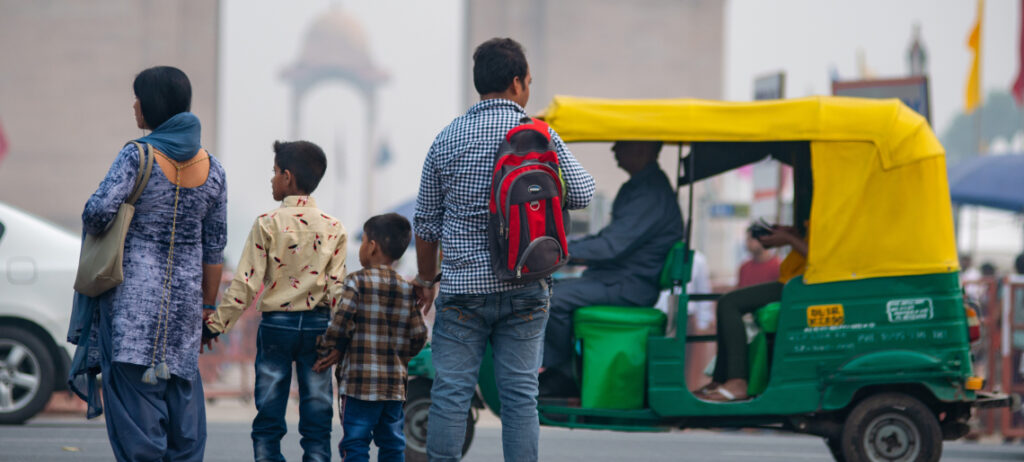Journey
Janaagraha was founded in December 2001 by Swati and Ramesh Ramanathan. Their contrasting experiences as citizens in Indian and global cities inspired them to pioneer citizen participation and urban governance reforms in India.
Our focus in the initial years was on catalysing citizen participation. Over time, we realised that transforming urban quality of life required the participation of not just citizens but also government and state machinery. In 2005, we began work on urban policy reforms.
We partnered with government agencies on complex urban challenges and developed a deeper understanding of participatory platforms as well as the different factors that would positively impact high-quality urban governance. Our experiences and learnings from this phase led to the development of the City-Systems Framework, our Theory of Change that redefined how we approach urban transformation.
Read more about our 20-year journey in the ‘Tending to the City’ book
The Ward Works Campaign marked the launch of Janaagraha and aimed to enable citizens to have a say in their city budgets. Rs. 120 crores of works were prioritised to Rs. 10 crores and 22 of the 65 participating wards declared the campaign a success.
Bala Janaagraha, our citizenship education initiative, was launched with the mission of making ‘every child an active citizen’. Through the program, we have engaged with over 400,000 students from 700+ schools across 29 cities.
Launched in partnership with the Bengaluru City Corporation, PROOF was an initiative to publish the city’s quarterly financial reports and promote public discussion on the data. The campaign led to us drafting the Public Disclosure Law, which we recommended the central government include under the Jawaharlal Nehru National Urban Mission (JnNURM). Our work on improving the financial strength of cities continues through our work on Municipal Finance.
Ward Works evolved into the Ward Vision Campaign with a focus on building a three-year vision in 10 wards covering major infrastructure themes like water, roads, parks, mobility, and land use. Over 2,000 citizens engaged in the campaign, which also brought together different departments of the city government.
When the need for regular ward meetings emerged, we facilitated Model Ward Sabhas between 2003-2005 and again in 2015-2018 across 25 wards. These meetings saw 100% attendance from ward councillors and 84% attendance from civic officials. 140 Resident Welfare Associations and community groups were engaged and represented approximately 1,000 citizens. Our efforts to strengthen Ward Sabha platforms continue through our programs on civic participation.
Janaagraha was instrumental in conceptualising and advocating for the Jawaharlal Nehru National Urban Renewal Mission (JnNURM). We drafted the Model Nagara Raj Bill to institutionalise citizen participation and the model Public Disclosure Law as well.
Run in partnership with Tata Tea, Jaago Re was a national, youth-focused voter registration campaign that enabled 6 lakh youngsters to become voters. Jaagte Raho, the second phase of the campaign, was designed to achieve 100% accuracy in the voter list of one pilot constituency (Shantinagar in Bengaluru). The learnings from this initiative were consolidated in the P.U.R.E report.
The Ward Infrastructure Index is a measure of the quality of public infrastructure and various community assets. Since 2008, we have published different sets of these indices to improve public and government understanding of infrastructure levels and to enable data-driven budgetary allocations.
The Janaagraha-Brown Citizenship Index is an equal partnership in concept and execution between Brown University and Janaagraha. It measures the quality of citizenship in urban India by measuring how Indian citizens can effectively use their civil, political, and social rights in cities.
IChangeMyCity enables citizens to participate in local civic matters through web and mobile apps. It works as a multi-way communication system between citizens, civic officials, and councillors on grievances, budget campaigns, civic information and data. IChangeMyCity powers the country’s largest civic technology platform, the Swachhata Technology Platform.
As part of this initiative, Janaagraha worked with the Bengaluru City Police to mobilize citizen participation and improve the safety and security of our neighbourhoods. The program engaged 1,800 police personnel, more than 590 citizen volunteers, 1 lakh children and 4 lakh citizens.
Run in partnership with the city government of Bengaluru, MyCityMyBudget, is a participatory budgeting initiative. In 2020, the initiative witnessed unprecedented success with the Bengaluru city government allocating Rs. 120 crores – Rs. 60 lakhs for each of the city’s 198 wards – to be expended under the aegis of the respective Ward Committees.
Over the years, we have successfully engaged with the 13th, 14th and 15th Finance Commissions, and have had our recommendations accepted and implemented. In 2021, we also provided technical support to the 6th Haryana State Finance Commission, conducting a landscape study and outlining a reform roadmap for the state
As part of a landmark MoU with Rajasthan, Janaagraha worked with the state on developing and implementing municipal reforms as well as establishing a Municipal Finance Reform Cell.
ASICS is India’s only independent benchmarking framework that assesses the quality of urban laws, policies, institutions, and institutional processes. It is a health diagnostic tool that evaluates a city’s ability to provide its citizens with a high quality of life.
Since 2017, our work has continued along three aspects of the City-Systems framework – Civic Participation, City Finance, and Governance.
Please click here to see our current work.
Since 2017, we have channelled our efforts and energies into strengthening and scaling city-systems.
We now partner with governments at the national and state level on policy reform, program design, and citizenship-building initiatives.
As we enter our third decade, we hope to create lighthouse initiatives, weaving in climate and health, and applying an equity lens focused on women and the urban poor to accelerate urban reforms.


